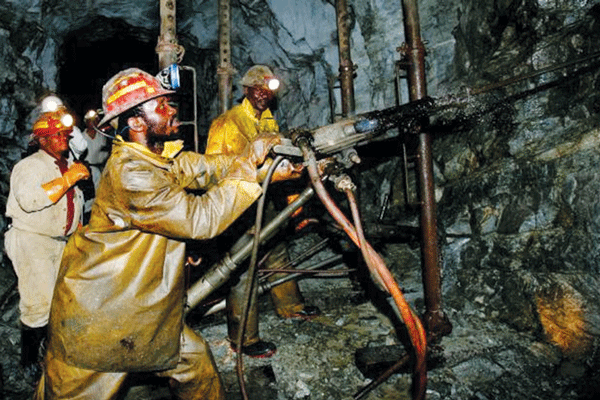Source: Miners push wage negotiations to next year – The Zimbabwe Independent December 13, 2019
Gold miners are currently paying 14 cents per (KWH); they are paying at a premium while other users are paying 10 cents
Kudzai Kuwaza
NEGOTIATIONS for the 2020 minimum wage in the mining sector have been pushed to next year due to the deepening economic crisis characterised by quickening inflation, businessdigest has learnt.
The country is facing its worst economic crisis in a decade, punctuated by a debilitating liquidity crunch, acute foreign currency shortages, prolonged power cuts lasting up to 18 hours daily, industrial capacity utilisation of less than 40% and runaway inflation of more than 400%.
Associated Mineworkers’ Union of Zimbabwe president Tinago Ruzive told businessdigest on Wednesday that the hyperinflationary environment has resulted in the wage talks with the Chamber of Mines to be postponed due to the rapid decline of the local currency.
Negotiations over the minimum wage for the year are usually held in the last quarter of the previous year.“We have not started negotiations as we usually do for the upcoming year because of the inflationary environment,” Ruzive said.
“Because of the inflation, we agreed that we cannot negotiate now what the wage structure will be in 2020. There is unanimity with the chamber on that.”
He said that the currency volatility as a result of the decline of the local unit had sharply eroded incomes, with workers struggling to buy basic commodities.The two parties recently agreed on a 90% increase in the minimum wage, the third time that an increment has been effected this year as a result of the inflationary environment.
The two parties agreed a 35% cost of living adjustment to cushion workers from the current inflationary environment in July this year. Mine workers had demanded a 50% increment, with the employers’ body initially offering a 26% raise, before settling for a cost of living adjustment of 35%.
This is on top of the 80% increment they had agreed upon in March as the minimum wage for 2019.Mine workers had demanded US dollar-denominated salaries, citing that it was the only way they could cushion their incomes from the vagaries of inflation.
The Chamber pointed out that it was not feasible, unless mining companies were allowed to retain at least 80% of their foreign currency receipts by the Reserve Bank of Zimbabwe (RBZ).
In an interview earlier this year, immediate past Chamber of Mines president and Bindura Nickel Corporation managing director Batsirai Manhando pointed out that labour is one of the major cost drivers in the sector.
“The mining industry has reviewed the minimum wage rate for its employees a record 14 times in 9 years since 2009, resulting in a cumulative wage increase of around 780% between 2009 and 2018,” Manhando said.
“Labour costs have remained a huge cost driver in the mining industry, constituting around 34% of total revenue in the sector. In this regard, any upward adjustment to the wage rate will have serious consequences on the cost, and hence viability of mining companies. With most companies making losses and some having already been placed under care and maintenance, there is growing concern that there will be some company closures if the cost structure remains unsustainably high.”
Newer Post
Housing shortage a national concern Older Post
We’ve thieves among us: Zanu PF 
COMMENTS